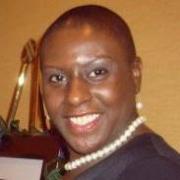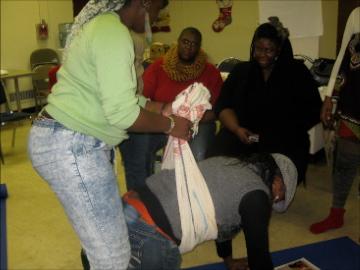Brooklyn Breastfeeding Empowerment Zone sparks neighborhood-wide change
Tell us about the Breastfeeding Empowerment Zone and how it began.
The Brooklyn Breastfeeding Empowerment Zone is a 3-year initiative funded by the W.K. Kellogg Foundation in partnership with the New York City Department of Health and Mental Hygiene to address the low rate of breastfeeding in the neighborhoods of Bedford Stuyvesant and Brownsville. For over 10 years, District Public Health Offices (DPHOs) of the NYC Department of Health and Mental Hygiene have been committed to engaging community members in a joint effort to improve the health and well-being of families in high-poverty communities experiencing poor health outcomes. The Breastfeeding Empowerment Zone grew out of the work of a Brooklyn DPHO program, Healthy Start Brooklyn, which endeavored to improve breastfeeding rates in target neighborhoods through counseling and home visits for mothers of newborns. The realization became clear that race, culture, family support systems, and community infrastructure, including capacity, impact a family’s choice to breastfeed. To help address this, the Brooklyn Breastfeeding Empowerment Zone focuses on male engagement, local capacity and economic development, community education, and mobilization.
Tell us about an experience you've had that conveys the importance of the BFEZ.
During the launch of the Breastfeeding Empowerment Zone, a father shared the struggles he and his partner experienced in breastfeeding. This couple decided that breastmilk was the optimal nutritional choice for their baby. They were unaware of resources in the neighborhood that could have supported them through the many challenges they faced. Latch challenges, as well as frequent vomiting and spit-up led to a suspicion of allergies to breastmilk by both parents. On the third day, they started mixing rice-cereal with formula, but still with a desire to breastfeed their baby. Unfortunately, they did not meet their breastfeeding goals. This father felt he had failed to provide sufficient advocacy for his partner and baby. As the project’s manager and a mother, I do not want any parent to have a sense of failure in parenting their children. Resources should be common knowledge to all community members. Choices are not real when there are inadequate resources, support and education within walking distance.
What data do you use to show the importance of breastfeeding and the impact of the BFEZ?
Local institutions must work together to “speak the same language” in the area of data collection in order for us to develop interventions that speak to our specific communities. For the purpose of the Brooklyn Breastfeeding Empowerment Zone, we have collected qualitative data through a short-term longitudinal study interviewing expectant first-time mothers in their third trimester regarding their infant feeding decision-making and followed them until a few weeks after the birth of their baby to see the trajectory of their decision. We wanted to know what the barriers and enablers were. We asked mothers to identify their key influencers including the father, grandmother and health providers, and then we interviewed them. We will share the results formally later this year.
We also conducted interviews with community stakeholders to understand the opportunities and gaps relating to supporting breastfeeding mothers and families. We have spoken with existing breastfeeding service providers—including doulas, certified lactation counselors and male peer educators—as well as faith-based leaders and small businesses. We gained insight into belief systems and their perceived role in breastfeeding support. We also evaluated their sense of efficacy and empowerment to effect community change. Self-determination is essential to long lasting change.
What is one thing the person reading this can do to support the BFEZ?
Community plays an integral role in a family meeting their breastfeeding goals. Existing services also largely impact physiological challenges relating to breastfeeding, without really addressing women’s needs for everyday community, peer and sister support. If you see a mom breastfeeding in public, give a nod of solidarity or tell her that she is doing something great. In our community surveys, residents shared they had seldom or never saw a woman breastfeeding in public. The best encouragement of breastfeeding and changing norms is seeing other people do it in everyday situations. Mom does not have to hide at home. Feelings of isolation and shame diminish a mother’s desire to breastfeed or stick with it.
What is an area of breastfeeding support that is being overlooked and what should be done about it?
A key finding in our interviews is that women and families experience many barriers relating to unpaid maternity leave, having to return to employment in service industries and other blue-collar workplaces that lack adequate workplace accommodations for breastfeeding mothers. Many women cite returning to work as the reason they decided not breastfeed. The story of women of color in the United States, African-American women in particular, is built on a foundation of work—staying home to raise and nurture their own family was not the paradigm. We must encourage employers to implement family-friendly work policies, which include lactation support. The Affordable Care Act includes provisions for breastfeeding support. Here in New York State, we have a strong workplace accommodation policy, as well as, the Pregnant Workers Fairness Act in New York City. The work is in getting employers to understand how it benefits their bottom-line and implementing policies at their site that meet the need. Much more has to be done to get employers and other employees to be supportive of breastfeeding.
What's your favorite breastfeeding resource (i.e., article, blog post, video, and website)?
Business Case for Breastfeeding. As we engage local businesses, not only do we want them to support breastfeeding families who are their customers but also their employees. The website gives helpful and practical tips on how employers can champion the health and well-being of families.




The views and opinions expressed in this post are those of the author(s) and do not necessarily reflect those of MomsRising.org.
MomsRising.org strongly encourages our readers to post comments in response to blog posts. We value diversity of opinions and perspectives. Our goals for this space are to be educational, thought-provoking, and respectful. So we actively moderate comments and we reserve the right to edit or remove comments that undermine these goals. Thanks!